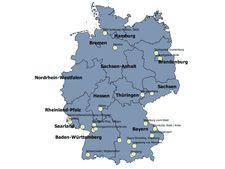-
Topics
subnavigation
Topics
Electromagnetic fields
- What are electromagnetic fields?
- Static and low-frequency fields
- Radiation protection relating to the expansion of the national grid
- High-frequency fields
- Radiation protection in mobile communication
Optical radiation
Ionising radiation
- What is ionising radiation?
- Radioactivity in the environment
- Applications in medicine
- Applications in daily life and in technology
- Effects
- What are the effects of radiation?
- Effects of selected radioactive materials
- Consequences of a radiation accident
- Cancer and leukaemia
- Genetic radiation effects
- Individual radiosensitivity
- Epidemiology of radiation-induced diseases
- Ionising radiation: positive effects?
- Risk estimation and assessment
- Radiation protection
- Nuclear accident management
- Service offers
-
The BfS
subnavigation
The BfS
- About us
- Science and research
- Laws and regulations
- BfS Topics in the Bundestag
- Links
Quality assurance measures in airborne gamma spectrometry
- The main field of application of airborne gamma spectrometry is the rapid and large-scale determination of ground-deposited radioactive material in the context of emergency preparedness.
- "Airborne radiation detection" is carried out in close cooperation between the BfS and the German Federal Police.
- National or international measurement campaigns are carried out every year.
- In order to keep the scientific quality of airborne gamma spectrometry at the current level, the BfS initiates research projects among other things.
Since 1993, the task "airborne radiation detection" has been carried out in close cooperation between the Federal Office for Radiation Protection (BfS) and the German Federal Border Police (Federal Police (BPOL) since 2005).
Measurement campaigns
In order to ensure operational readiness in airborne gamma spectrometry at any time, national or international measurement campaigns are carried out every year.

![]() Areas in Germany where airborne gamma spectrometry measurement exercises have been conducted since 1993
Areas in Germany where airborne gamma spectrometry measurement exercises have been conducted since 1993
The cooperation between the BfS and the BPOL is trained within national measurement campaigns. To that end, the BfS and the BPOL perform measurement flights in areas with different terrain structures and significantly increased levels of radiation.
The exercises focus on
- the large-scale mapping of natural radionuclides,
- the optimisation of the measurement and evaluation software as well as
- the timely on-site evaluation of the recorded measurement data and the transmission of the measurement results to an evaluation centre.
Research projects
The main field of application of airborne gamma spectrometry is the rapid and large-scale determination of ground-deposited radioactive material in the context of emergency preparedness, for example after a nuclear accident. In order to keep the scientific quality of airborne gamma spectrometry at the current level, the BfS initiates research projects among other things.
In 2011, the BfS launched the research project "Further development of the airborne gamma spectrometry measurement systems of the Federal Office for Radiation Protection (BfS) and adaptation of the measurement and evaluation methods to the requirements of emergency preparedness (2011-2014)" that was conducted by the independent technical service corporation TÜV SÜD.
In the scope of the research project the following methods were developed:
- modelling of photon flux densities taking into account complex boundary conditions;
- angle and fuel level dependent calibration of the measurement system built into the helicopter;
- a method for extending the operational capability of airborne gamma spectrometry (for example when air contaminations are present).
State of 2017.11.16


